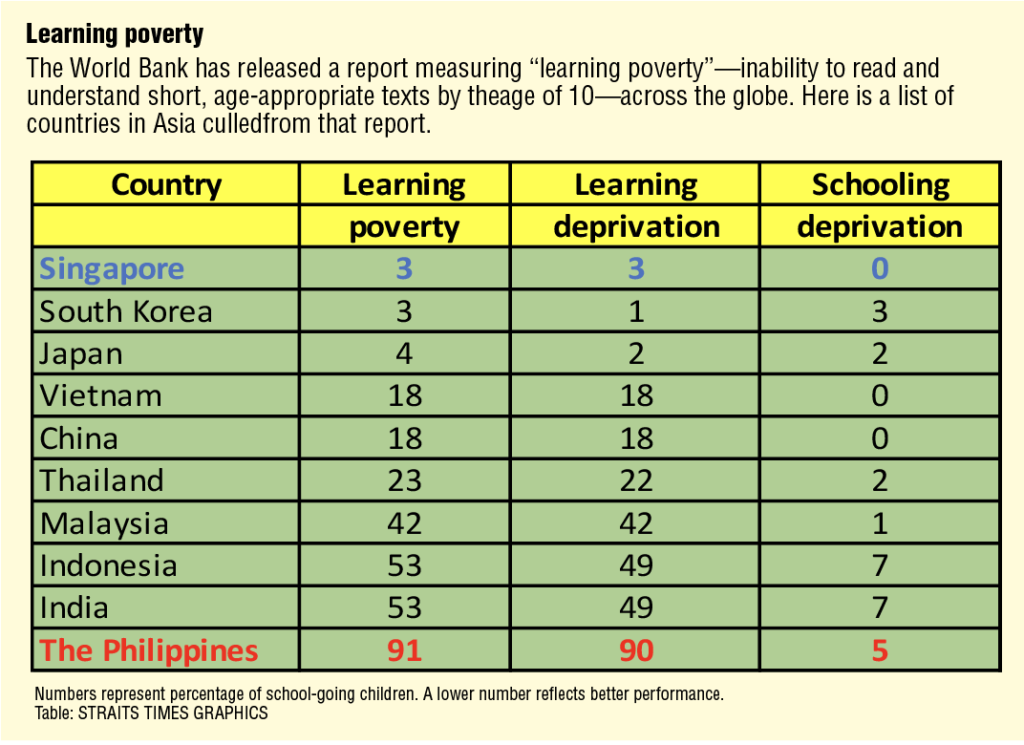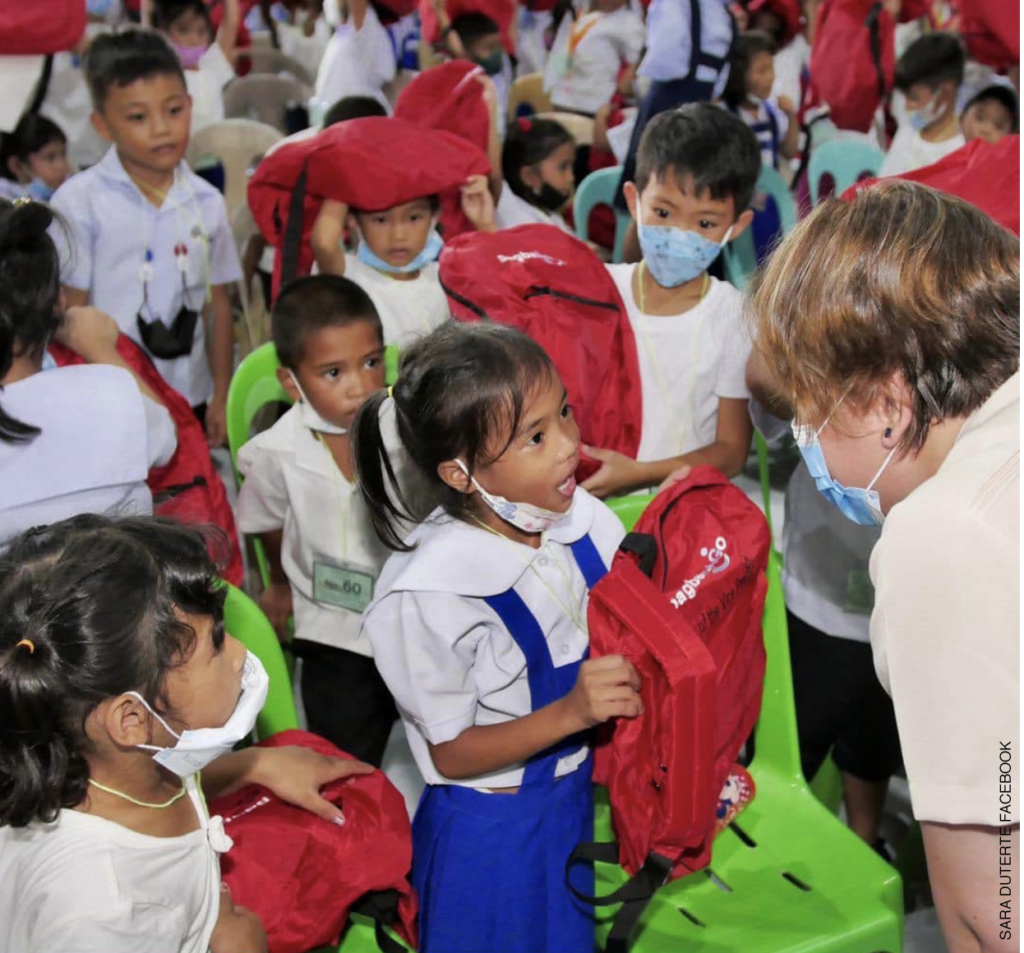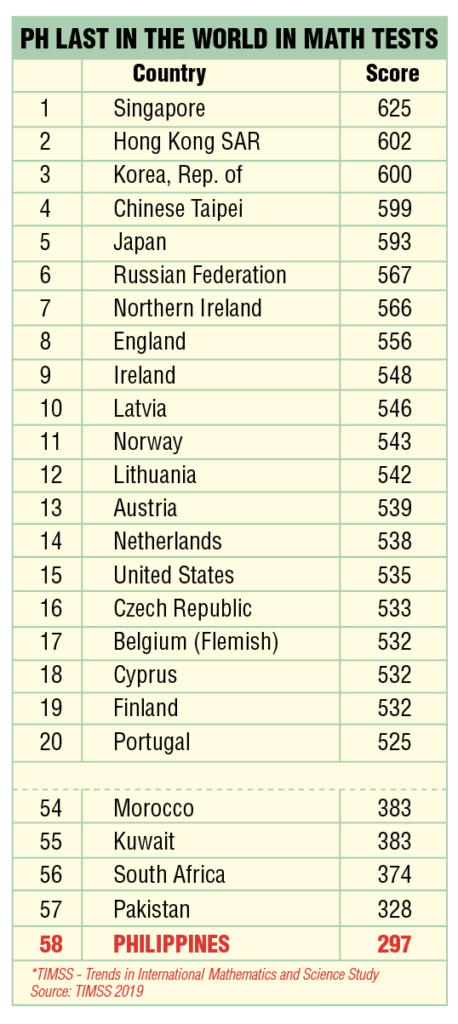The biggest crisis of our time is not inflation, not stagnation, not even corruption. It is what the World Bank calls learning poverty.
All children by age 10 must be able to read and understand a simple text. If a ten-year-old cannot do that, then he is indeed very poor. He suffers from the worst form of poverty, stupidity. Siya ay mangmang at tanga (He is uneducated and stupid).
Explains the World Bank: “Learning poverty means being unable to read and understand a simple text by age 10. This indicator brings together schooling and learning indicators: it begins with the share of children who haven’t achieved minimum reading proficiency (as measured in schools) and is adjusted by the proportion of children who are out of school (and are assumed not able to read proficiently).”

Before COVID, in 2019, 90% of our ten-year-olds already suffered from learning poverty. After the peak of the pandemic, 97% became learning poor.
The Philippines’ learning poverty is the highest in Asia, meaning our young are the most stupid people in Asia where 60% of the world’s population lives.
If you cannot read and write by age 10, you cannot possibly attain higher education. If you cannot have a modicum of education, you cannot find a job.
Such a situation can cripple a nation’s economy. Per World Bank estimates, lost income due to learning poverty is about 17% of GDP or a year’s worth of economic production.
The Philippines has a GDP, in nominal dollars, of $450.34 billion. And 17% of that is $76.55 billion. Multiplied by 55, $76.66 billion is P4.2 trillion or P4,200 billion.

resident Bongbong Marcos’s education budget for 2023 is P852.8 billion, up 8.2% from 2022, and 16.19% of next year’s P5.268 trillion budget described as his Agenda for Prosperity.
Said President BBM in his Budget Message to Congress: “Ascertaining the future of the Filipino youth, we follow the Constitutional mandate of giving Education the biggest portion of the budget and further increased this by 8.2%. To ensure access to education for all, especially the poor, the budget for Education Assistance and Subsidies has been practically doubled, jumping from P30.4 billion to P54.9 billion.”
The P852.8 billion education budget consists of the allocations for the Department of Education (DepEd), State Universities and Colleges (SUCs), Commission on Higher Education (CHED), and Technical Education and Skills Development Authority (TESDA). “While this is consistent with the Constitutional mandate to assign the highest budgetary priority to Education, it also reflects my commitment to invest in human capital development and empower the youth,” BBM explains in his budget message.
The budget of the Department of Education (DepEd) proper is P710.6 billion, an increase of 12.3% from P633.3 billion in 2022.
BBM’s priority is not education actually, but roads, railways, and ports.
A total of P1.196 trillion has been allocated for the government’s 2023 infrastructure. This is P485.4 billion or 68% more than DepEd’s P710.6 billion budget.

The Department of Public Works and Highways itself has a budget of P718.4 billion, still P7.8 billion higher than DepEd’s P710.6 billion allocation.
“President Marcos earlier said that this administration shall continue to implement infrastructure projects and refocus to Build, Better, More. These projects—subway, regional airports, railways, and farm-to-market roads—will surely benefit the Filipino people,” says Budget Secretary Amenah Pangandaman.
Major transportation infrastructure projects include the North-South Commuter Railway, the Metro Manila Subway Phase 1, the LRT-1 Cavite Extension, and the PNR South Long Haul.
If you ask me, all the P1.196 trillion infra budget of BBM should be poured into education. Of what used are roads, railways and ports if our kids cannot read the road and traffic signs, do not know how to follow directions, nor are able to compute how much fare they should pay. Rats, dogs, and pigs would probably do better riding public transport and using public roads because they simply use their sense of smell.
Human infrastructure (the brain) is the most important infrastructure of all.
Our young are the most stupid people on earth. Three years ago, before the pandemic, our young were already third from the last in competency tests in reading, math, and science. Today, they are the last in the world. And the world has 220 countries.
Our young cannot read and even if they can read, they cannot understand what they can read.
They cannot compute beyond two digits. And of course, not being able to read nor compute, they cannot understand science nor are they able to explain the how and why of things.
In the last international exams (conducted by TIMSS in 2019) participated in by our Grade 4 students (the 10 to 11 year olds), Filipinos finished last in math, with a score of 297, down 61 points from 358 in 2003.
The Pinoy kids were beaten by the next to the last, Pakistan, which had a score of 328 (31 points higher than Ph’s), and the third to the last, South Africa, with a score of 374 (77 points higher than Ph’s). No. 1 in the TIMSS exams was Singapore with a score of 625, up from 594 previously
In the TIMSS exams of 2019, the lowest benchmark score was 400, for one to be functionally able to do simple math and explain it in simple English.
Yet, our kids even scored lower than the already low 400 benchmark—an astronomical 103 points lower. Only 19% of our pupils who took the TIMSS exams passed the 400 benchmarks for low achievement in math.
So if we add the P1.196 trillion budget of BBM for infra and the P710.6 billion DepEd budget, we get P1.9 trillion.
This is only 45% of the P4.2 trillion annual losses in GDP terms due to learning poverty.
I am sure BBM and his cabinet and all the 331 congressmen and 24 senators do not suffer from learning poverty.
They can read BBM’s budget message and understand it. They can count up to trillions –which is 12 digits, (stupid ones can count only up to two digits).
Therefore, our government people, who eat up P31 of every P100 of the national budget as salaries, and steal another P30 of every 100, understand our crisis in our learning poverty.
— Tony Lopez
